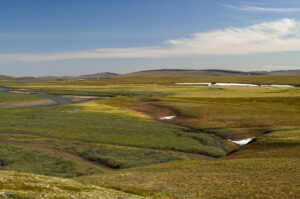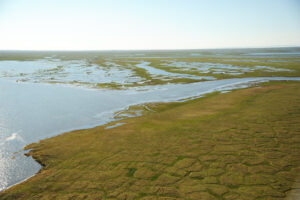
A lackluster hunting rule and the latest onslaught of lawsuits
By Dawnell Smith
We got the blahs last month when the National Park Service unveiled a lackluster sport hunting rule that prohibits bear baiting in Alaska’s national preserves but leaves a slew of other destructive practices in place.
We also saw several lawsuits aimed at undermining protections in the Arctic and Bristol Bay. Let’s take a look at what happened, starting with the hunting rule.
No bear baiting is good… and then there’s the rest
The Park Service’s new rule bans bear baiting on national preserves in Alaska, and that’s good news, but the rule also allows hunting practices like these to continue:
-

Brown Bears in Lake Clark NP&P, Photo by Madison Grosvenor
Hunting and killing black bear cubs and sows with cubs using artificial light at den sites
- Killing wolves and coyotes—including pups—during denning season
- Using dogs to hunt black bears
- Killing swimming caribou
- Killing caribou from motorboats under power
The rule recognizes the Park Service’s authority to regulate sport hunting practices on national preserves in Alaska, asserts hunting practices that aim to reduce predator populations are incompatible with agency policies, and even says the agency can do more. But, rather than prohibiting these troubling practices, the Park Service seems to throw its hands in the air.
In other words, the rule inexplicably fails to prohibit troubling state-sanctioned sport hunting practices including those that aim to reduce predators in favor of prey species The Alaska Board of Game promotes the idea that killing predator animals increases the number of moose and caribou available to hunters. That goal does not align with the purposes established for these parklands, and also the data does not support those conclusions.
A November 2022 report shows no long-term increase in moose harvests by hunters in a specific area of Alaska despite decades of hunting practices that systematically kill bears and wolves. An array of factors influences the health of caribou and moose populations, including disease, food availability, loss of habitat, industrial projects splicing across migration routes and food sources, and of course climate change, which can exacerbate all those factors and more.
All of which is to say that it’s great that the Park Service saw the urgency of prohibiting bear baiting for human safety reasons, and also it could have done much more. Our attorney Joanna Cahoon said the bear baiting ban will help protect the natural relationships bears have with other animals and allow people to engage with and experience national preserves in many ways, including through recreation and wildlife viewing, “but the Park Service should have used its authority to finalize a stronger, clearer rule like the agency’s own proposed rule from 2023.”

Photo by D Kopshever NPS
That 2023 proposed rule recognized that hunting practices aimed at reducing bear and wolf populations have no place in national preserves.
Many of us hunt in Alaska, and within the state’s national preserves. The challenge here is that the Park Service is allowing sport hunting practices on public lands that undermine legal obligations to protect and preserve wildlife by attempting to alter natural predator prey dynamics. In doing so, the Park Service is failing to give everyone—paddlers, hikers, campers, and those wanting to view the full array of Alaska wildlife, including bears and wolves—a chance to experience these park lands in the way they choose.
The Park Service affirms it can do more and we’re hopeful it will. We will always work to ensure that national parklands in Alaska support all wildlife and all the ways in which people want to experience park lands in Alaska.
About all those lawsuits—the western Arctic
A recent slew of lawsuits filed by the State of Alaska, oil and gas corporations, Alaska Native corporations, and local governments aim to undermine protections put in place for the western Arctic.

NPRA Utukok, Photo by J Schoen
Five of the lawsuits focus on the western Arctic, challenging a recently adopted rule that provides a means to protect special places within the National Petroleum Reserve-Alaska and carry out Congress’ directive. The suits claim that the U.S. Bureau of Land Management does not have the authority to put forward a rule that provides a process for expanding or adding designated areas or to control where or how oil and gas companies can operate. The Bureau this month announced that it was seeking input on whether to update those protected areas.
The fact is that Congress has required maximum protection of designated special areas to preserve fish and wildlife, cultural resources, recreation opportunities, and subsistence foods and traditions for nearly 50 years. Congress was also clear that it expected the Bureau to put in place strict mitigation measures for areas where oil and gas operations take place.
The State of Alaska, ConocoPhillips, North Slope Exploration/Energy, the North Slope Borough, and Voice of the Arctic Iñupiat—the last of which is a coalition of groups largely funded by the Arctic Slope Regional Corporation—filed the five lawsuits. We will closely watch this litigation, which is at odds with the interests of groups we work with and the Alaskans and Americans who want to protect Arctic lands, wildlife, food access, and our climate future.
State of Alaska says “show me the money” in novel lawsuit around the Arctic Refuge
The state of Alaska filed a lawsuit this month claiming that the federal government cost it billions of dollars for cancelling leases in the Arctic National Wildlife Refuge. The suit claims the state would have made billions of dollars of revenue if the leases were not cancelled.
These claims seem to ignore the failure of the January 2021 lease sale, notably called a flop due to the lack of oil industry interest. There were only a few minimum bids from three bidders: one speculator without any Arctic oil experience, one small oil company, and the Alaska Industrial Development and Export Authority—a state entity frequently criticized in the news for its lack of legislative oversight, public transparency and fiscal responsibility.

Arctic National Wildlife Refuge view near Canning River Delta, photo courtesy of USGS
The lawsuit claiming compensation in the billions does not line up with the reality on the ground. We will continue to stay vigilant as those promoting drilling on sacred lands in the Arctic Refuge continue to bring lawsuits that prioritize profits over people, and oil rigs over the health of the Arctic and the planet.


